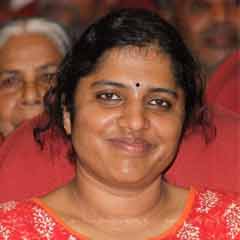In his 82 years of life, for 22 years, Njattyela Sreedharan was known as a beedi worker, and for 24 years, a blue printer at the Kerala Public Works Department. It took him 25 years of passionate persistence that earned him a new title, of a lexicographer, that too, for compiling a multilingual dictionary in four Dravidian languages – Malayalam, Tamil, Telugu and Kannada. In the ‘Dictionary of Dravidian Languages’ with 1.25 lakh words, each Malayalam word has the corresponding words in the other three languages, all of them scripted in Malayalam. The dictionary will be published on November 1, Kerala's formation day.
A school dropout, Sreedharan started learning languages as a hobby which soon grew into a passion as he delved deeper into language, colloquial words, grammar and script. “When I started this, I just wanted to learn the languages and had no intention or dream to publish it as a dictionary,” says Sreedharan, who learnt Tamil during his beedi factory days in Palakkad. “During my PWD career, I got acquainted with T P Sukumaran, a professor at Nirmalagiri College, who, after knowing about my passion for learning languages, suggested compiling a dictionary of colloquial words.”
That was the beginning. Sreedharan started learning Kannada and Telugu, reading periodicals and newspapers, interacting with native speakers and often travelling to Mysuru and Nellore for research. He recalls, “To learn Kannada, I got immense help from writer C Raghavan and Govinda Naik, and for Telugu, I was helped by Eeshwaraprasad Rao, an officer at District Agricultural Farm, Karimbam, Kannur, and his wife Seethamma.”

Though he had started writing since 1984, it was after his retirement in 1994 that Sreedharan dedicated to fulltime lexicography. His wife Yasodha and four children have been immensely supportive of his passion and sojourns for words. Apart from penning Malayalam articles and questioning wrong words and linguistic usages in published works, Sreedharan has suggested corrections in several dictionaries and articles.
The hunt for words and nuances of language turns Sreedharan ecstatic. He would never settle for adjustments and would pursue the mission till he gets it right. He recalls the quest for the Telugu equivalent of the word ‘vayamb’ (an ayurvedic plant) which took him six years till he found it. Another tough nut to crack was ‘seemantharekha’ (the parting of the hair where married women apply sindoor), the Sanskrit word which was mistaken as Malayalam, and had Kannada (baithale) and Telugu (pawada) equivalents, but nothing in the other two languages. He travelled to Tamil Nadu, met professors, school teachers, homemakers and anyone he met, but couldn’t find the exact word. Finally, months later, it was a Tamilian woman who came to collect scrap from his home who gifted him the word he was looking for – ‘vakidu’. “That was the Malayalam word too. Dravidian languages share many a similarity; we just don’t care enough to explore that,” he says.

Euphorically recalling his eureka moments, he says, “Searching for the exact word in four languages is not simple; it might take months and years. But without all the four words, the work is futile. The process is more like a prayer. There won’t be any other thought in my mind and sometimes, the word would pop up in a dream, and I wake up at midnight and write it down.”
‘Dreaming of Words’, an hour-long documentary directed by civil engineer-turned-filmmaker Nandan, about Sreedharan’s life and lexicography, talks of the undeterred enthusiasm of the octogenarian. Nandan, who himself, had given up a search for a Malayalam-Telugu-Tamil-Kannada dictionary long ago, came to know about Sreedharan from a newspaper clipping. Intrigued, he met the man and was amazed by his zeal. “The whole dictionary was handwritten by Sreedharan. His unique dictionary had no takers as he lacked formal required academic credentials,” Nandan says.
After years of hard work, Sreedharan, on the behest of a friend, took the handwritten manuscript to several publishers, but the work was rejected. He then approached the Kerala Bhasha Institute, where the then director P K Pokker, interested in the project, decided to help him. For lack for experts to proofread the work, the institute, kept it on hold and after one year, published the Malayalam-Tamil version of the dictionary. “After that, the director board of the Bhasha Institute changed. Dr M R Thampan was the director then. I was told that there was no way to publish the dictionary in four languages as there were no experts to evaluate it. I understand that a school dropout becoming a lexicographer would naturally upset the academicians, who are experts in the field. That too would have been a reason. However, after a while, I was told that my manuscript has gone missing from the institute. It was work for over two-and-a-half decades and I had no other copy of it,” says Sreedharan, who after taking it up with politicians and ministers in futile, decided to fight it legally.

After suing the institute, he got it back in 2014. He got the DTP work of the 856-page dictionary done with the help of a youngster in Kannur some time back. Come November 1, Kerala's formation day, Koothuparamba-based Senior Citizens’ Forum will bring out the first multi-lingual Dravidian language dictionary in Malayalam by Njattyela Sreedharan. Each copy is priced at Rs 1,500.
Sreedharan feels that Dravidian languages haven’t got the due credit it deserves. “Lexicographers focus a lot on Malayalam and Tamil, but Kannada and Telugu are rich languages and are very similar to Malayalam on many fronts. In my work, I have attempted a comparative study of the four Dravidian languages and decipher the similarities between the languages,” he says.

(Vandana Mohandas is an independent journalist based in Kochi)

















